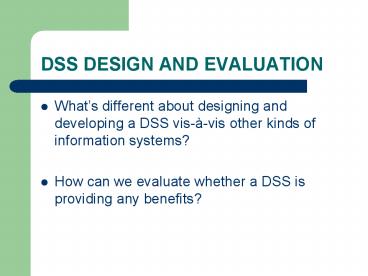DSS DESIGN AND EVALUATION - PowerPoint PPT Presentation
1 / 15
Title:
DSS DESIGN AND EVALUATION
Description:
Start with well thought out statement of requirements ... Model Solution (solvers e.g., simplex, regression) Sensitivity Analysis (what if, goal seeking) ... – PowerPoint PPT presentation
Number of Views:191
Avg rating:3.0/5.0
Title: DSS DESIGN AND EVALUATION
1
DSS DESIGN AND EVALUATION
- Whats different about designing and developing a
DSS vis-à-vis other kinds of information systems? - How can we evaluate whether a DSS is providing
any benefits?
2
SYSTEM LIFE CYCLE
- Planning
- Analysis
- Design
- Development
- Testing
- Evaluation
- Deployment
- Maintenance
3
DSS PROTOTYPE DEVELOPMENT PROCESS
- Start with well thought out statement of
requirements - Develop broad (but shallow) prototype with high
productivity tools - Interact with users to get feedback
- Enhance (deepen) prototype incorporating feedback
- Continue iterative process until acceptable
production version emerges - Continue adaptive enhancements during operational
phase
4
THREE LEGS TO A SUCCESSFUL IMPLEMENTATION PROCESS
- Small, Talented Team
- Knowledge of implementation tools
- Ability to learn application domain
characteristics - Ability to contribute through entire system life
cycle - Ability to deal effectively with users
5
THREE LEGS (continued)
- Contemporary Software Development Tools
- Languages Java, C, VB
- Web-based XML, Java Script, ASP, ODBC
- Object-based UML, CORBA
- ADEs and CASE Tools PowerBuilder, Oracle
Designer - Component-oriented COTS software
- DSS Generators LDW, Analytica, Exsys
6
THREE LEGS (continued)
- Adaptive Methodology
- User-driven
- Informal coordination
- Complete access to users at all levels in the
organization - Authoritative support
7
DSS DESIGN CHARACTERISTICS ROMC
- Representations provide representations that
support appropriate conceptualization of decision
problem - Operations support cognitive activities of
formulation, analysis, and interpretation - Memory Aids long-term and short-term
- Control Mechanisms control and direct the course
of problem-solving
8
DSS COMPONENTS
Data Management
- Model
- Management
Knowledge Management
GUI
User
9
DATA MANAGEMENT
- Legacy System
- DBMS
- Relational
- SQL / QBE
- Dictionary / Repository
- Web-DBMS Development Tools
- Data Warehouse
10
MODEL MANAGEMENT
- Model Base
- Modeling Languages (AMPL GAMS SAS)
- Model Generators (e.g., Analytica LDW)
- Model Solvers
- Spreadsheets
- Database Interfaces
- Desirable Features
- What if
- Goal seeking
- Uncertainty (probability)
- Dynamic modeling
11
MODEL MANAGEMENT Modeling Life Cycle
- Requirements
- Model Formulation (modeling languages DSSG)
- Data Collection
- Model Solution (solvers e.g., simplex,
regression) - Sensitivity Analysis (what if, goal seeking)
- Model Calibration (is model realistic?)
- Model Validation (do users believe model
results?) - Deployment
- Maintenance and Enhancements
12
KNOWLEDGE MANAGEMENT
- Knowledge Acquisition
- Knowledge representation
- Knowledge Validation
- Desirable Features
- Inference engine (forward backward chaining)
- Explanation capability
- Truth maintenance
13
USER INTERFACES
- Input How does user manipulate DSS?
- Command Language
- Menus
- Q A
- Natural Language
- Voice
- GUI (e.g., GIS)
14
USER INTERFACES (continued)
- Output How are results of DSS presented to user?
- Graphics (e.g., charts)
- Spreadsheets
- Animation (e.g., simulations)
- Maps
15
MEASURES FOR DSS EVALUATION
- Productivity measures time and cost to make a
decision (is decision making more efficient?) - Process measures number of alternatives
generated and examined (is decision making more
effective?) - Perception measures user friendliness
confidence in results - Product measures technical performance (e.g.,
response time, reliability, etc)































